Russia's invasion of Ukraine jeopardizes food security in Africa
Shocks to global food supply chains could lead to social and political unrest
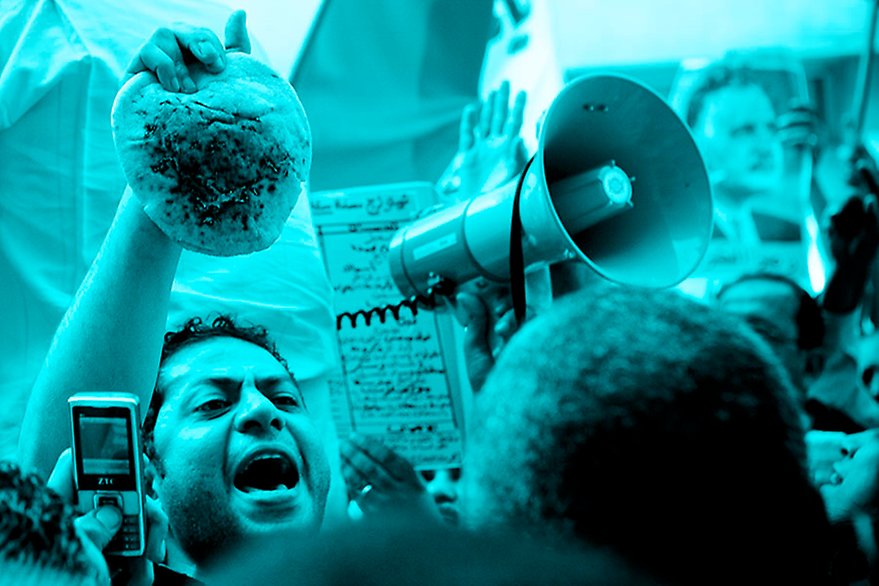
Cairo, Egypt, May 2010. Activist Bahaa Saber carrying a loaf a bread, and talking to workers and activists during a demonstration against the government. Photo: Hossam el-Hamalawy.
Apart from being a humanitarian tragedy, Russia’s invasion of Ukraine has also emerged as an exogenous shock to global food supply chains, with severe consequences for many African countries in particular. Four months into the invasion, we can see three main threats to food security in Africa: a disruption to energy markets and shipping routes; a shortage of fertilizers; and the negative ‘third-party’ effects of sanctions imposed on and by Russia.

By Assem Abu Hatab, senior researcher, the Nordic Africa Institute
Although the war is being waged more than a thousand miles away, African countries in particular are not screened from its repercussions, which endanger fragile food systems and foreshadow worrying impacts on food security and nutrition on the continent. These consequences threaten to derail national and global efforts to end hunger and poverty and to achieve sustainable development goals on the continent.
The vulnerability of African food systems
A food system External link, opens in new window. comprises various elements and activities related to food production, processing, distribution and consumption, as well as the associated output of such activities. Africa’s food systems are especially susceptible to the impact of exogenous shocks, including geopolitical conflict, due to the inherent environmental, socioeconomic and institutional characteristics of the agricultural and food sectors. For instance, with their significant contributions to economic growth (around 25% of GDP) and employment (around 50% of the labour force), food systems largely determine economic development and the provision of other essential socioeconomic services in Africa.
External link, opens in new window. comprises various elements and activities related to food production, processing, distribution and consumption, as well as the associated output of such activities. Africa’s food systems are especially susceptible to the impact of exogenous shocks, including geopolitical conflict, due to the inherent environmental, socioeconomic and institutional characteristics of the agricultural and food sectors. For instance, with their significant contributions to economic growth (around 25% of GDP) and employment (around 50% of the labour force), food systems largely determine economic development and the provision of other essential socioeconomic services in Africa.
In recent decades, land and water resources in many African countries have, however, been dwindling at an alarming rate. Climate and nature-induced changes are increasingly bringing harsher conditions for agricultural production to many regions of the continent. In tandem with this, the continent’s rapid urbanization is associated with high rates of urban sprawl over prime agricultural land. Taken together, these challenges jeopardize the capacity of Africa’s food systems to meet the food security of a rapidly rising population. Just as important is the heavy reliance of African countries on the international market to meet their domestic food needs: over 80% of food consumed domestically is imported External link, opens in new window. from outside the continent. Therefore, the characteristics of African food systems increase their vulnerability to exogenous shocks and add further sustainability pressure to efforts aimed at eradicating hunger, reducing poverty and achieving food security.
External link, opens in new window. from outside the continent. Therefore, the characteristics of African food systems increase their vulnerability to exogenous shocks and add further sustainability pressure to efforts aimed at eradicating hunger, reducing poverty and achieving food security.
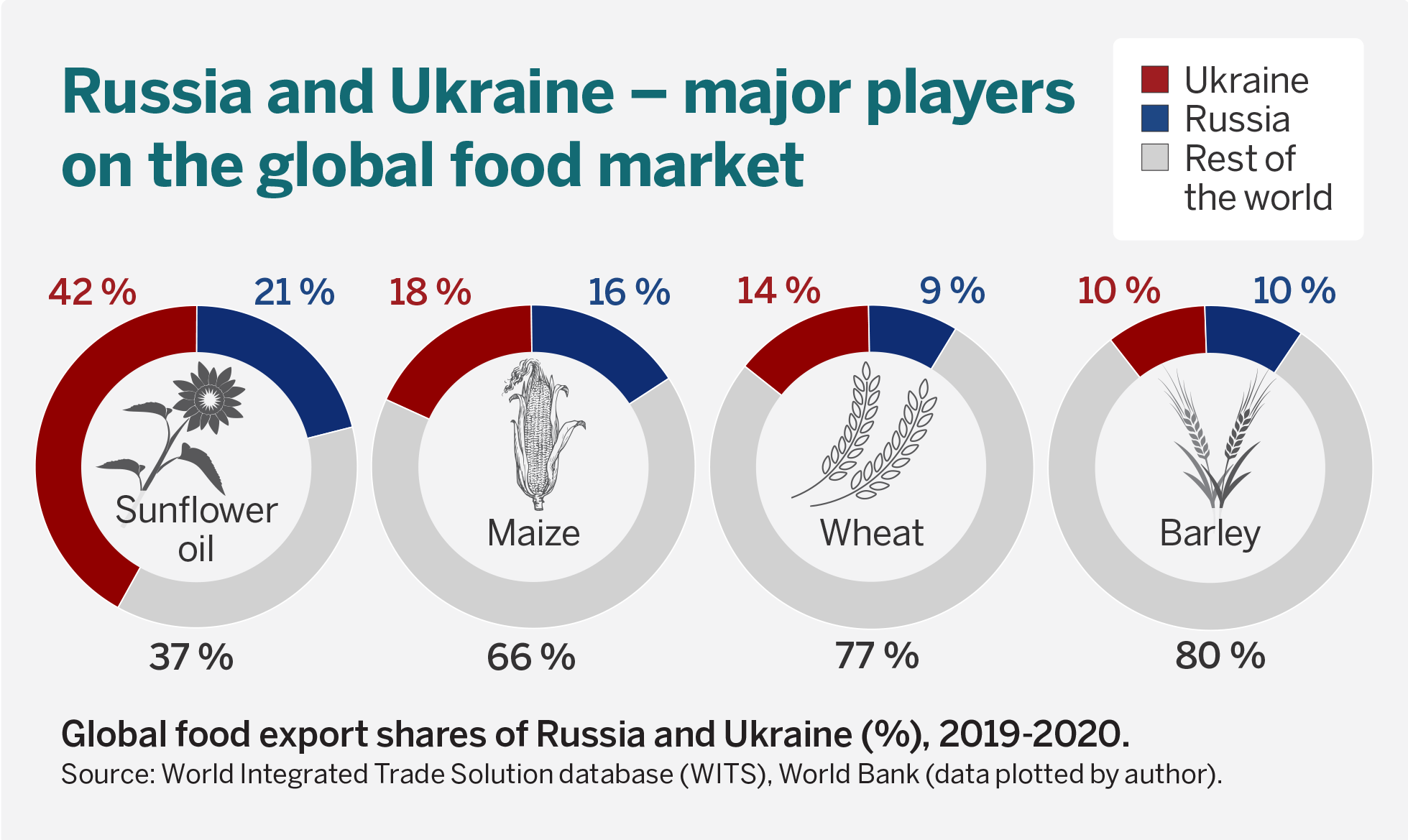
Two particularly aggravating factors
To gain a better understanding of the current and likely future impact of the invasion on Africa’s food security, two important factors should be considered jointly. The first is to do with the timing of the invasion: it has coincided with a period when food supply chains (FSCs) in Africa are still struggling to recover from the Covid-19 pandemic, which disrupted FSC activities over the last two years right along the chain External link, opens in new window.. Compared to other developing regions, African FSCs bore the full brunt of the pandemic, due to their resource constraints and the limited governance capacity, which prevented governments from responding adequately to the consequences of the pandemic for hunger, poverty and inequality. In this respect, the FAO estimates
External link, opens in new window.. Compared to other developing regions, African FSCs bore the full brunt of the pandemic, due to their resource constraints and the limited governance capacity, which prevented governments from responding adequately to the consequences of the pandemic for hunger, poverty and inequality. In this respect, the FAO estimates External link, opens in new window. that the pandemic has added up to 40 million undernourished people in Africa, and has increased the proportion of Africans who are food stressed by 30% and who are in food crisis by 35%. On top of this, the 2019 plague of desert locusts across several East African countries threatened over 13 million people
External link, opens in new window. that the pandemic has added up to 40 million undernourished people in Africa, and has increased the proportion of Africans who are food stressed by 30% and who are in food crisis by 35%. On top of this, the 2019 plague of desert locusts across several East African countries threatened over 13 million people External link, opens in new window. in the Horn of Africa with acute food insecurity. As for today, FAO estimates show that about a fifth of the continent’s population suffers from hunger – a higher proportion than in any other region of the world.
External link, opens in new window. in the Horn of Africa with acute food insecurity. As for today, FAO estimates show that about a fifth of the continent’s population suffers from hunger – a higher proportion than in any other region of the world.
The second factor is related to who the two parties involved in the conflict are. Both Russia and Ukraine are major players on the global food market, with a joint share of around 12% of globally traded calories. In particular, those two countries jointly provide nearly two thirds of traded sunflower oil, a quarter of global wheat exports, a third of maize and a fifth of barley. In 2020, the two countries collectively supplied agricultural and food products to African markets worth a total of around USD 7 billion. In particular, the majority of African countries depend heavily on wheat imports from Russia and Ukraine to keep hunger at bay: for instance, Benin and Somalia obtain all their wheat exclusively External link, opens in new window. from Ukraine and Russia. In 2019–2020, Egypt depended on Russia and Ukraine for 82% of its wheat imports; and it was a similar story in Sudan (75%), Congo-Brazzaville (69%) and Senegal (66%).
External link, opens in new window. from Ukraine and Russia. In 2019–2020, Egypt depended on Russia and Ukraine for 82% of its wheat imports; and it was a similar story in Sudan (75%), Congo-Brazzaville (69%) and Senegal (66%).
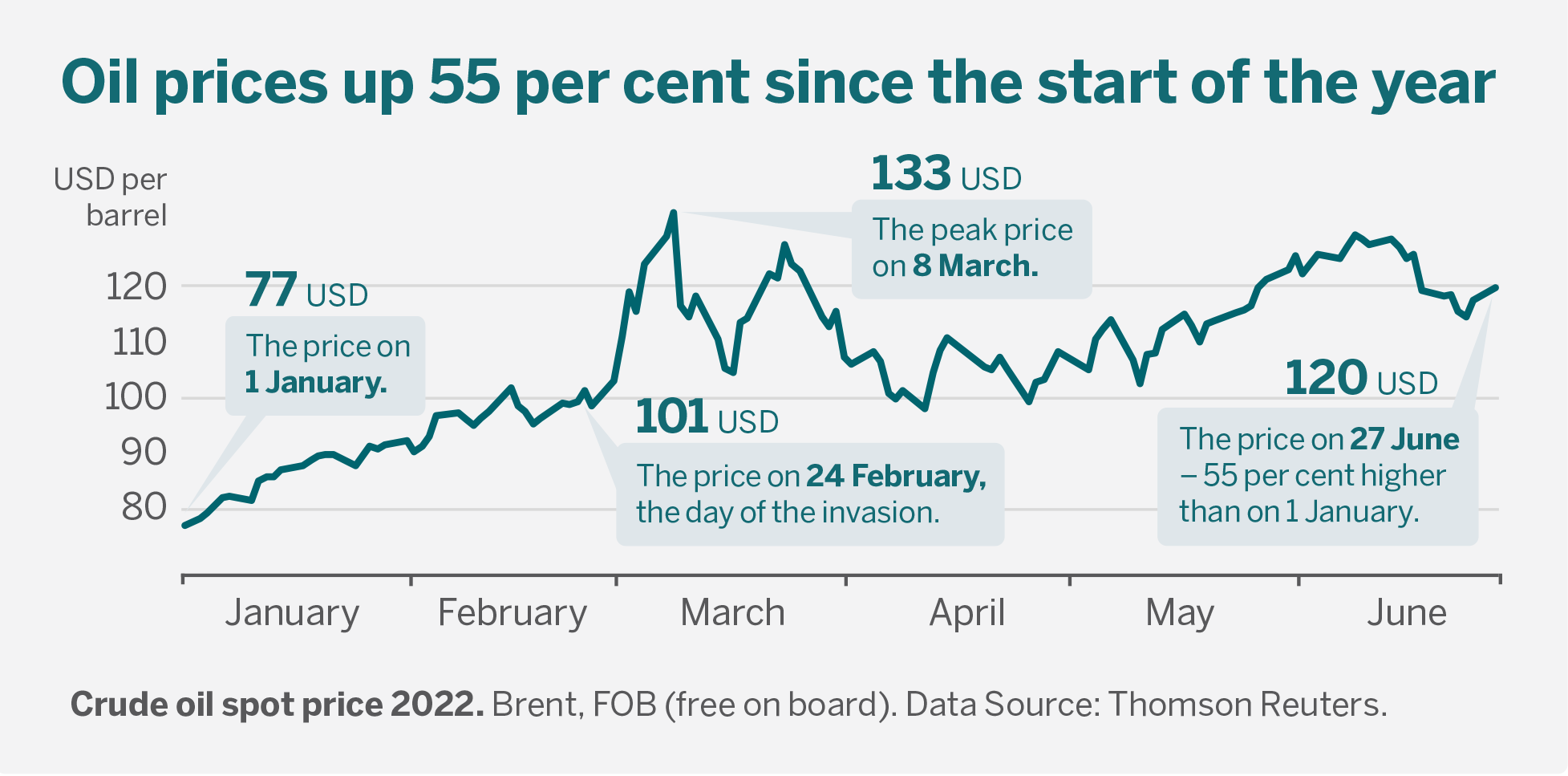
Ways in which FSCs are disrupted
A closer look at the developments and trends in global food markets over the four months since the invasion on 24 February underlines three major channels by which the Russian military action against Ukraine disrupts African FSCs and subsequently threatens food security:
- Disruption to energy markets and shipping routes: Since Russia is a major exporter of oil and energy products worldwide, global oil prices have soared since the start of the war, to exceed the USD 100/barrel threshold for the first time in eight years. The war has also rendered many parts of the Black Sea dangerous or unpassable and has led to the closure of most Ukrainian ports, through which more than two thirds of Ukrainian food and grain exports used to be distributed. This has translated into higher ocean shipping charges for food commodities and increased costs for alternative air and rail transportation. Half the countries of Africa – 27 out of 54 – are defined by the World Bank as low-income countries. Theoretically, there is a strong correlation between global oil and food prices in low-income countries, as direct and indirect energy use can account for more than half of the total variable costs of agricultural production. Examples of energy use in agricultural production include fuel consumption for agricultural machinery and the operation of production facilities; electricity use in irrigation; and the energy required for downstream activities, such as cooling, processing, transporting and distributing food products. Therefore, rising energy bills have spillover effects on various activities along the food chain that undoubtedly increase food production costs and ultimately lead to higher food prices.
- Shortage and the rising price of fertilizers: Russia is the world’s top producer of natural gas, which is an important component of the ammonia and urea used in the fertilizer industry. Prior to the conflict, fertilizer markets were already under severe supply stress due to the sanctions imposed by the EU and the US on Belarus in 2021, as well as to the sharp spikes in the price of natural gas in 2021. In the wake of the invasion, the Russian Industry Ministry imposed a temporary embargo on fertilizer exports to guarantee supplies to domestic farmers. Other countries, such as China, have also suspended their exports of certain fertilizers to ensure adequate supplies for domestic food production. In Africa, fertilizer use varies considerably and depends on multiple factors, including soil quality and weather conditions; but fertilizer consumption as a share of production on the continent ranges from 20% to around 80%, which implies that agricultural production is vulnerable to price rises and the availability of fertilizers. The shortage or unaffordability of fertilizers can significantly reduce agricultural production and yields in Africa at a time of dwindling global stocks and surging global food prices. And that subsequently pushes food prices even higher.
- Negative externalities of financial measures and trade sanctions: Over 9,000 different targeted sanctions are now imposed by Nato and allied countries on Russia, making it the world’s most sanctioned country. Russia has hit back by imposing significant counter-sanctions on the US, EU member states, the UK and Canada, among others. These counter-sanctions involve a ban on the export of a series of products, including agricultural commodities. On the import side, the disruption caused to global food trade by these sanctions and counter-sanctions is likely to create significant shortages in the food supply in African markets, stimulate further spikes in food prices and damage food and nutrition security for consumers. What could make things even worse is that the war has come just as drought and volatile climate conditions in several food-exporting countries are putting pressure on global food supplies. On the export side, Russian – and, to a lesser extent, Ukrainian – demand for imported food commodities, especially fresh fruit and vegetables, has been growing over the past two decades, offering export opportunities for small producers and exporters in many African countries (e.g. Egypt, Morocco and Kenya) to increase their market share in those two markets. The closure of ports has led to a sharp decline in demand for certain perishable foods imported into Russia and Ukraine from African countries. For instance, South Africa’s agricultural exports to the two countries – mainly oranges, mandarins, lemons, pears, apples and wine –were valued at USD 260 million in 2020
 External link, opens in new window.. The foodstuffs were mostly produced by smallholder farmers and exported by small and medium-sized enterprises. African producers and exporters without adequate storage facilities and with limited scope to switch markets now find themselves with commodities that they cannot export; this is likely to have an adverse effect on their livelihoods and food security.
External link, opens in new window.. The foodstuffs were mostly produced by smallholder farmers and exported by small and medium-sized enterprises. African producers and exporters without adequate storage facilities and with limited scope to switch markets now find themselves with commodities that they cannot export; this is likely to have an adverse effect on their livelihoods and food security.
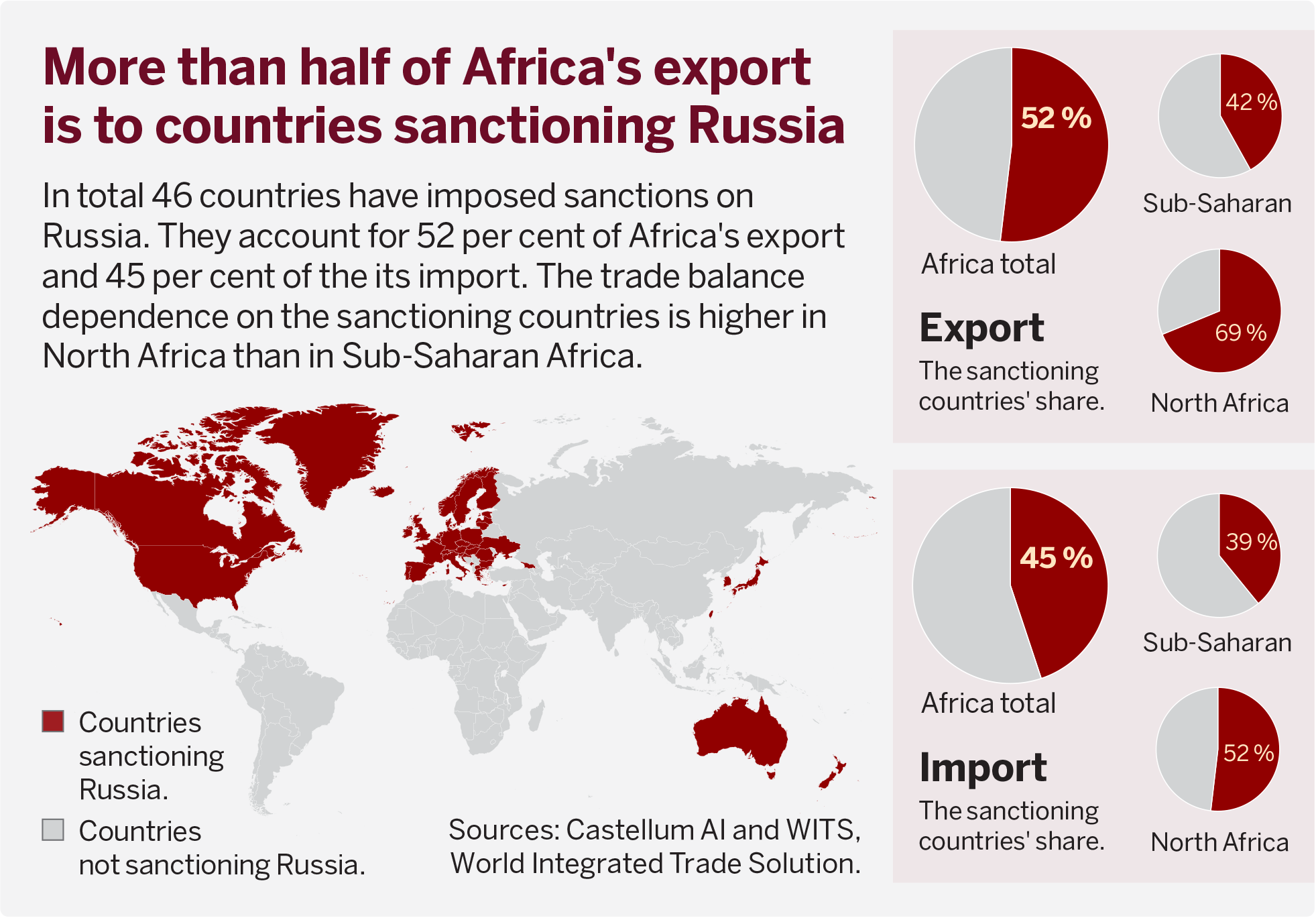
Risk of social and political unrest
Africa’s heavy reliance on international food markets and the large share of food costs in African household expenditure (e.g. 45% in Egypt; 54% in Nigeria) imply that rising global food prices and food supply shortages will stimulate inflation in domestic food prices – the FAO food price index External link, opens in new window. stood at 200% in the first quarter of 2022 – and will sharply reduce the purchasing power of poor households. Customarily, food price inflation in Africa leads to enduring effects on headline inflation
External link, opens in new window. stood at 200% in the first quarter of 2022 – and will sharply reduce the purchasing power of poor households. Customarily, food price inflation in Africa leads to enduring effects on headline inflation External link, opens in new window. through inflationary expectations and workers’ demands for higher wages. The evidence suggests that disruption to FSCs and spikes in domestic food prices are severely damaging the social and economic wellbeing of vulnerable population groups, exacerbating the pre-existing risk of food insecurity and could result in dramatic ‘food riots
External link, opens in new window. through inflationary expectations and workers’ demands for higher wages. The evidence suggests that disruption to FSCs and spikes in domestic food prices are severely damaging the social and economic wellbeing of vulnerable population groups, exacerbating the pre-existing risk of food insecurity and could result in dramatic ‘food riots External link, opens in new window.’. In many African countries, such food riots could trigger social and political unrest
External link, opens in new window.’. In many African countries, such food riots could trigger social and political unrest External link, opens in new window.. Thus, the impact of the Russia–Ukraine conflict not only threatens food security, but could inflame conflict and destabilize African governments and political systems. This scenario should not be taken lightly: eight years ago, in 2014, the rise in food insecurity across sub-Saharan Africa was attributable to violent conflict. And a decade ago, food price inflation served as a catalyst for the ‘Arab Spring’ in North Africa
External link, opens in new window.. Thus, the impact of the Russia–Ukraine conflict not only threatens food security, but could inflame conflict and destabilize African governments and political systems. This scenario should not be taken lightly: eight years ago, in 2014, the rise in food insecurity across sub-Saharan Africa was attributable to violent conflict. And a decade ago, food price inflation served as a catalyst for the ‘Arab Spring’ in North Africa External link, opens in new window..
External link, opens in new window..
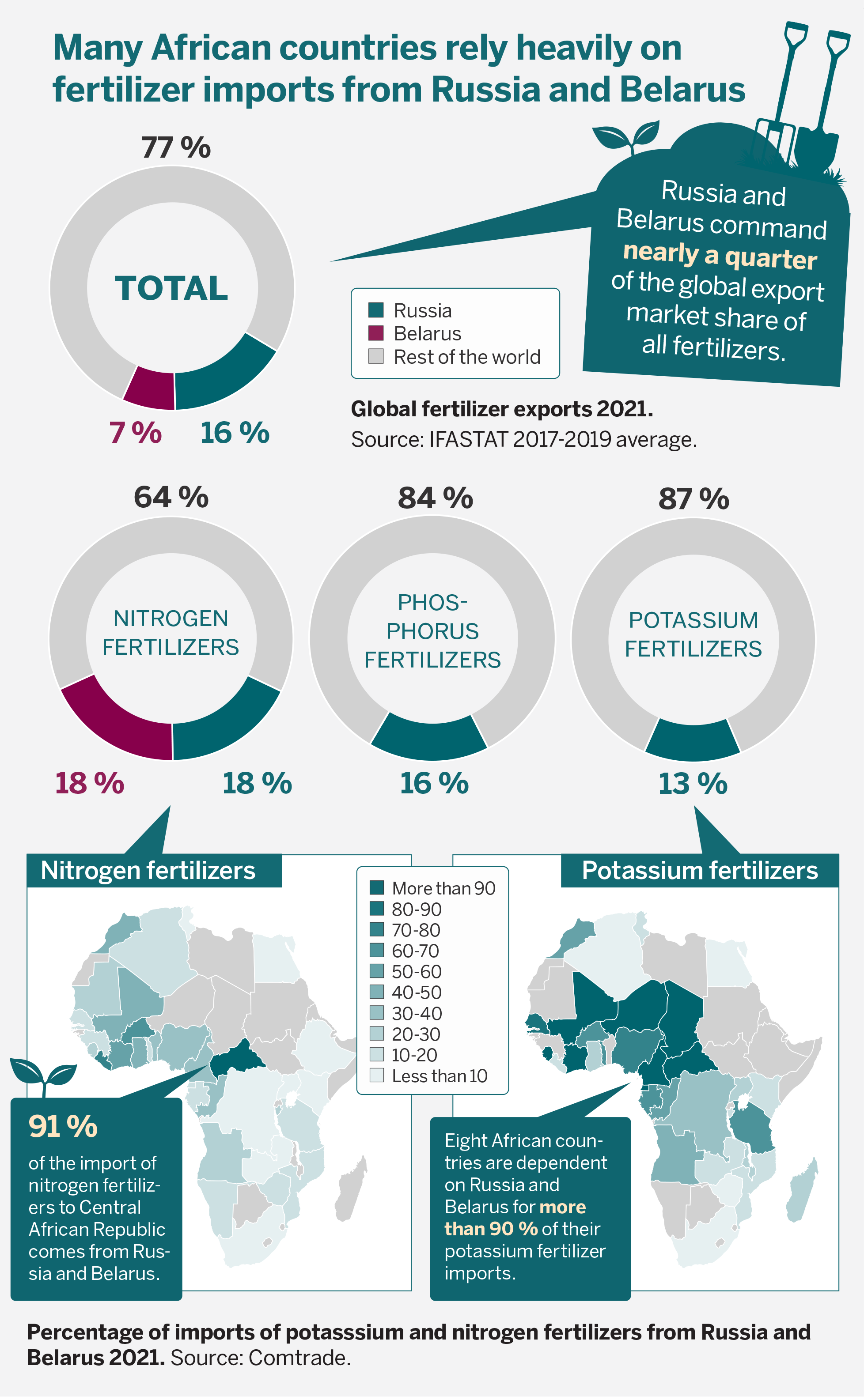
Policy recommendations
- In the short run, it is crucial to strengthen social protection systems and ensure food security for the most vulnerable, by increasing their purchasing power or by directly providing food through government or community-based programmes.
- The current geopolitical situation requires African countries to play an active role on the world stage in terms of policy and diplomacy. In particular, efforts by the African Union to ease the war-related impact on FSCs are important in limiting food insecurity.
- The global response to the Russian invasion of Ukraine should take account of the food security dimension: measures and sanctions imposed on Russia should not have a ‘third-party’ effect, penalizing African populations that are already food insecure and that rely on food supplies from Russia and Ukraine.
- Export-restricting policies by food-exporting nations – like those implemented at the start of the Covid-19 pandemic – should be avoided, as they can have a knock-on effect on African FSCs and food security.
- African countries should take full advantage of the African Continental Free Trade Area to increase intra-African agri-food trade and reduce their reliance on the international markets during times of exogenous shocks.
- In the longer term, stronger international co-operation is needed to build the productive capacities of African food systems and enhance their resilience and preparedness to deal with future shocks.
- Accelerated investment in sustainable agriculture needs to be leveraged to deliver on the longer-term goal of a more inclusive, environmentally sustainable and resilient African food system.
NAI Policy Notes are a series of research-based briefs on relevant topics, intended for strategists and decision makers in foreign policy, aid and development. They aim to inform and generate input to the public debate and to policymaking. The opinions expressed are those of the authors and do not necessarily reflect the views of the Institute. The quality of the series is assured by internal peer-review processes and plagiarism-detection software.
About the author
- Assem Abu Hatab is a senior researcher at the Nordic Africa Institute and an associate professor in development economics. With a special interest on the economics and sustainable management of natural resources and food systems he studies the interlinkages with sustainable development in African and low-income countries.
Further reading
The NAI policy notes series is based on academic research. For further reading on this topic, we recommend the following titles:
- Abu Hatab, A. (2022). Africa’s food security under the shadow of the Russia-Ukraine conflict. Forthcoming in the Strategic Review for Southern Africa.
- Abu Hatab, A. & Hess S. (2021). “Feed the mouth, the eye ashamed”: Have Food Prices Triggered Social Unrest in Egypt?
 External link, opens in new window. Contribution to the 31st conference of the International Association of Agricultural Economics (IAAE), 17 August, 2021.
External link, opens in new window. Contribution to the 31st conference of the International Association of Agricultural Economics (IAAE), 17 August, 2021. - Bellemare, M.F. (2015). Rising food prices, food price volatility and social unrest
 External link, opens in new window.. American Journal of Agricultural Economics 97 (1): 1–21.
External link, opens in new window.. American Journal of Agricultural Economics 97 (1): 1–21. - Omidvar, N., Ahmadi, D., Sinclair, K. and Melgar-Quiñonez, H. (2019). Food security in selected Middle East and North Africa (MENA) countries: an inter-country comparison
 External link, opens in new window.. Food Security, 11 (3), pp.531-540.
External link, opens in new window.. Food Security, 11 (3), pp.531-540.
How to refer to this policy note:
Abu Hatab (2022). Russia's invasion of Ukraine jeopardizes food security in Africa : Shocks to global food supply chains could lead to social and political unrest. NAI Policy Notes, 2022:5. Uppsala: Nordiska Afrikainstitutet. http://urn.kb.se/resolve?urn=urn:nbn:se:nai:diva-2693 External link, opens in new window.
External link, opens in new window.
